- Home
- Linda Lael Miller
Corbin's Fancy
Corbin's Fancy Read online
“ONE OF THE HOTTEST ROMANCE AUTHORS WRITING TODAY.”
—Romantic Times
Linda Lael Miller
CORBIN’S FANCY
When a traveling carnival left Fancy Jordan stranded in the rugged Washington Territory, she thought her luck had run out. Alone, penniless, she welcomed a most intriguing offer—to live in the home of Jeff Corbin’s brother and coax the wounded, withdrawn Jeff back to health and happiness.
But a villainous attack on his ship had hurt only his body—a far deeper sorrow tortured him, heart and soul. For as the beautiful gamine fell deeply in love with this handsome, brooding man, she faced a phantom rival…one that only the most splendid, most heartfelt passion could conquer!
VISIT US ON THE WORLD WIDE WEB
http://www.simonandschuster.com
Sigrid Estrada
LAEL ST. JAMES is a pseudonym for LINDA LAEL MILLER, the beloved bestselling author of more than thirty novels, of which there are more than twelve million copies in print. Most recently she received acclaim for her New York Times bestsellers Courting Susannah and One Wish, and her tales of life and love in the fictional towns of Springwater, Montana, and Primrose Creek, Nevada. Ms. Miller resides in the Scottsdale, Arizona, area.
Books by Linda Lael Miller
Banner O’Brien
Corbin’s Fancy
Memory’s Embrace
My Darling Melissa
Angelfire
Desire and Destiny
Fletcher’s Woman
Lauralee
Moonfire
Wanton Angel
Willow
Princess Annie
The Legacy
Taming Charlotte
Yankee Wife
Daniel’s Bride
Lily and the Major
Emma and the Outlaw
Caroline and the Raider
Pirates
Knights
My Outlaw The Vow
Two Brothers: The Lawman & The Gunslinger Springwater
Springwater
Seasons series:
Rachel
Savannah
Miranda
Jessica
A Springwater Christmas
One Wish
The Women of Primrose Creek
Bridget
Christy
Skye
Megan
Courting Susannah
Published by POCKET BOOKS
Thank you for purchasing this Pocket Books eBook.
Sign up for our newsletter and receive special offers, access to bonus content, and info on the latest new releases and other great eBooks from Pocket Books and Simon & Schuster.
or visit us online to sign up at
eBookNews.SimonandSchuster.com
This book is a work of historical fiction. Names, characters, places and incidents relating to nonhistorical figures are products of the author’s imagination or are used fictitiously. Any resemblance of such nonhistorical incidents, places or figures to actual events or locales or persons, living or dead, is entirely coincidental.
An Original Publication of POCKET BOOKS
POCKET BOOKS, a division of Simon & Schuster Inc.
1230 Avenue of the Americas, New York, NY 10020
www.SimonandSchuster.com
Copyright © 1985 by Linda Lael Miller
All rights reserved, including the right to reproduce this book or portions thereof in any form whatsoever.
For information address Pocket Books, 1230 Avenue of the Americas, New York, NY 10020
ISBN: 0-671-73767-8
ISBN: 9781476710709 (eBook)
First Tapestry Books printing August 1985
First Pocket Books printing April 1990
POCKET and colophon are registered trademarks of Simon & Schuster Inc.
Contents
Prologue
Chapter One
Chapter Two
Chapter Three
Chapter Four
Chapter Five
Chapter Six
Chapter Seven
Chapter Eight
Chapter Nine
Chapter Ten
Chapter Eleven
Chapter Twelve
Chapter Thirteen
Chapter Fourteen
Chapter Fifteen
Chapter Sixteen
Chapter Seventeen
Chapter Eighteen
For Sally Jean Lang—the girl with snowflakes in her hair
Prologue
Port Hastings, Washington Territory
December 24, 1887
THE GREAT HOLLY WREATH JIGGLED ON ITS HOOK AS JEFF Corbin slammed the front door behind him, wedged his hands into the pockets of his heavy seaman’s coat, and stomped down the steps.
Almost immediately, the door opened again. “Damn you,” barked a hoarse voice, “wait a minute!”
Jeff paused in the middle of the snowy walk, his shoulders tense, his jaw set in a hard line. He did not turn to face his brother; feeling the way he did, he couldn’t. Even when Adam came to stand before him, Jeff refused to meet his eyes or acknowledge his presence.
“How long are we going to keep this up?” Adam demanded, his hands rising to his hips.
Jeff said nothing, though imagined shouts of anger and hurt were reverberating through his mind. Because he rarely hid his feelings, it was especially difficult for him to remain silent.
“It’s Christmas, Jeff,” Adam reminded him, with uncommon patience. “You can’t leave now.”
“I have to leave now,” Jeff breathed, his gaze still carefully avoiding his older brother’s. His mind and heart were full to aching with pictures of Banner, his sister-in-law, and of the children she had borne Adam. They were twins—a boy and a girl.…
“Jeff.”
Jeff forced himself to look at Adam. The wind was bitterly cold that Christmas Eve; it stung both men and blew between them, severing the chain that had once joined their two souls. “I’ve got to go,” he said. “The Sea Mistress sails at dawn and the crew is already aboard.”
“Damn the Sea Mistress!” hissed Adam, lifting one hand to the back of his dark head in frustration. “I had to keep Papa’s illness a secret from you and everyone else, Jeff! Don’t you understand that?”
Jeff nodded. “I understand,” he said, but it was only a half-truth. For five years he’d believed his father dead; finding out that the man had been alive all the time had jarred him deeply.
“You don’t understand,” rasped Adam. “Jesus, Jeff, he had leprosy—”
“I know. And he had you to take care of him. The devoted son. Why in hell would Papa have needed me when he had you?”
Adam flinched slightly, but stood his ground. “It’s more than that, isn’t it?”
Jeff lifted his chin. “Yes, it’s more than that,” he replied evenly. “I love your wife, Adam. I love Banner and I wish to God that those two babies in there were mine. Does that make the problem clear enough?”
The explosion Jeff half expected didn’t come; Adam only sighed and tilted his head back to search the snow-shrouded heavens. Glistening, prismlike flakes gathered on his lashes and the strong planes of his face. “You’ll get over what you’re feeling now, Jeff. Just give yourself some time—”
Battling his emotions, Jeff made his way around the barrier of his brother’s tall frame and started toward the gate. “Time heals all wounds, doesn’t it, doctor?” he called back, glad that Adam could not see his face. “I’ll be gone about six months, so don’t wait up.”
Suddenly, Jeff felt himself whirled around. He was thrust backward against the heavy stone fence. Fury stung him, but its pulsing venom left him oddly weak and quite immobile.
“You are going to listen to me,” Adam drawled, glar
ing into Jeff’s face like a blue-eyed demon.
Jeff managed to thrust his brother’s powerful hands away from the lapels of his coat, but he could do no more, and his breath was coming hard, as though he’d just run a great distance. “Go to hell,” he said.
“I love you, too, Jeff,” Adam replied. Then he sighed again and spoke without the sarcasm that was so much a part of his nature. “Please, don’t go. Not like this—”
It happened. The sobs Jeff had been holding back broke free, tearing themselves from the depths of his chest, harsh and raw. “God damn you,” he choked out. “Damn you, Adam—I can’t stay—”
Adam drew his brother close, held him for a moment, then stepped back. His voice was hoarse. “You know, don’t you, that I wouldn’t have seen you hurt like this for anything in the world?”
Jeff nodded. “I know.”
Briefly, Adam touched Jeff’s shoulder. Then, without another word, he turned and walked back toward the house, where Banner waited. Banner, with her lush, cinnamon hair, her green, green eyes—
Jeff, so anxious to leave only moments before, stood still for a time, gazing up at the great stone structure that had always been his home, for all his travels. Tonight, however, it seemed to exclude him.
After almost a minute, Jeff Corbin unlatched the gate, opened it, and walked through. Oblivious to the cold and the biting snow, he made his way down the steep hill to the town, and then to the harbor beyond.
Reaching the long wharf where the Sea Mistress was moored, he drew a deep breath, hoped to God none of his grief showed in his face, and marched up the shifting, snow-laced boarding ramp.
His men greeted him with coarse jocularity, as they always did; he spared them a desultory wave of one hand and strode toward his cabin, his head down. Whiskey. What he needed now was whiskey.
The first thunderous blast shook the clippership just as Jeff reached the steps leading below deck, hurling him down into the companionway. There were screams and then another explosion sounded, seeming to tear at the innermost timbers of the ship.
Dazed, Jeff half crawled back up the steps to the main deck. There was fire everywhere; crimson flames crackled through the rigging, consumed the sails, skittered along the deck itself, and danced hellishly on the railings. Men jumped overboard, their hair and clothing afire, their cries of terror and pain incongruous with the petal-soft snowfall wafting down from a hidden sky.
The heat was unbearable and, as he lunged over the port side of the ship toward the darkness and oblivion that awaited him, Jeff thought he heard the devil laugh.
Chapter One
Wenatchee, Washington Territory
May 12, 1888
THE RABBIT WOULD NOT COME OUT OF THE HAT.
Fancy could feel the creature with her right hand—it was crouched deep inside its black velvet bag, shivering and stubborn and heavy. The crowd of children in front of the gazebo pressed closer, their freckled faces intent and smudged with strawberry ice cream, their eyes fixed on the battered top hat.
“She can’t make no rabbit come out of there!” one little boy complained. “That ain’t even a lady’s hat!”
“Maybe she ain’t no lady!” observed a barefooted demon.
Perspiration trickled between Fancy’s breasts and shoulder blades. She tugged harder at the rabbit, conscious of Mr. Ephraim Shibble’s cold glare of warning. Beyond his bulky frame, the glorious pink and white blossoms of the apple orchard seemed to shift and shimmer in a haze. Fancy noted distractedly that colorful ribbons, dozens of bright balloons, and even presents hung from the boughs of one tree.
“Don’t do this to me, Hershel,” she pleaded. A breeze scented with blossoms and bruised grass and picnic food cooled her burning cheeks and loosened the damp tendrils of silvery saffron hair clinging to the back of her neck.
“I told you she couldn’t do it!” howled the small heckler who had spoken first, squinting up at Fancy in hostile challenge.
Stung anew, Fancy wrenched at Hershel, hard, and he came out of his hat at last—the black bag that had hidden him hanging from his hind legs like a grim flag of defeat.
The adults who had gathered to watch shook their heads and turned away, some grumbling, some chuckling, some pitying the proud young woman who stood stiffly in her ridiculous star-speckled dress, still holding the rabbit aloft.
As the children scattered, too, Fancy bent and thrust an unrepentant Hershel into the wire cage secreted beneath her folding table. When she straightened, she was met with the condemning gaze of Mr. Ephraim Shibble, her employer.
The heavy man, suffering in his tight-fitting suit, bent to take up the worn placard that had stood in front of the table and perused it with calm disdain. “‘Fancy Jordan,’” he read, in mocking tones. “‘She sings. She dances. She does magic.’”
Fancy winced and clasped her hands together behind her back. “Mr. Shibble, I—”
Shibble interrupted by shaking the signboard; a shower of time-dulled glitter fell from the large, carefully formed letters. “You are a fraud,” he accused, in a scathing undertone. “You are an embarrassment! And you are out of a job!”
This was what Fancy had most feared, but she retained some semblance of composure and met Mr. Shibble’s small, watery eyes squarely. “You cannot leave me here,” she said, in even tones that betrayed none of the hysteria rising within her. “I have no position, no money—”
Shibble shoved the battered signboard into her hands. “Then I suggest that you sing and dance, since you are apparently incapable of magic. You will not travel another mile, Miss Jordan, with my company!”
“But—”
“No! You have humiliated me for the last time!” With that, Mr. Shibble turned and stormed away to watch one of the other members of the small traveling show perform. For a moment, Fancy, too, watched the Great Splendini wobble upon his “high wire,” which loomed all of five feet off the soft ground.
When she was sure that she would not be observed, Fancy sank down to sit on the gazebo’s top step, resting her head against the white-washed railing. A long, despondent sigh escaped her.
“You weren’t all that bad,” remarked a gentle, masculine voice.
Fancy, on the verge of tears, looked up to see a tall man standing before her, his arms folded, his azure eyes revealing both amusement and sympathy. He wore dark trousers, a vest over a pristine white shirt, and a clerical collar.
“I was bad enough to be fired,” she argued.
He bent, took the signboard from the gazebo floor where Mr. Shibble had dropped it, and read it pensively, as though it were some lofty treatise. “Can you really do magic?” he asked, after some moments.
Fancy blushed. Though one would never know it by the way her act had gone that afternoon, she was, as it happened, a fairly accomplished magician. She could draw coins from behind people’s ears, for example, and she could make fire flash from her fingertips. Once, on a particularly good night, she had even sawed a woman in half and put her back together again. Volunteers for that trick were hard to come by, though, and the props had been borrowed from another magician.
“Yes,” she said, with dignity, “I can do magic.”
“We could use some of that around here,” reflected the young minister.
Fancy looked about, really seeing her surroundings for the first time since her arrival earlier that day. Since then, she, like the rest of the troupe, had been too busy preparing for the noon performance to pay much attention.
Now she saw a massive, gracious stone house, the acres of lushly blossomed apple trees that flanked it, the green-gray river tumbling past the sloping front lawn, the gardens with their budding rosebushes and marble benches. “Do you live here?” she ventured, thinking it a marvel that a man of the cloth could be so prosperous.
“Yes,” replied the reverend, with a slight bow of his head and an amused twist of his fine lips. “My family owns the land, actually, and I manage it.”
Fancy was impressed. Once again her
gaze caught on the particular apple tree with the balloons, ribbons, and presents dangling from its boughs. She was certain that she had never seen such a festive sight. “Is it someone’s birthday?” she asked.
The reverend laughed softly. “No. My family has a tradition of celebrating the blossoming of the orchard. The entire community is invited and each of the children gets to take a gift from the tree.” He paused and frowned thoughtfully. “Sounds a little pagan, doesn’t it? Like a rite of spring or something.”
Despite her circumstances, Fancy smiled. “It’s a lovely idea,” she answered.
“I’m hungry, Miss Jordan,” the man announced suddenly. “How about you?”
Fancy was ravenous. There had been no time to eat that morning after leaving the train in nearby Wenatchee, a small but thriving settlement along the same green river that flowed past the house. “I have a rabbit we could roast,” she suggested, only half in jest.
The pastor grinned and offered his hand to help Fancy up from her perch on the gazebo steps. “That would take far too long, wouldn’t it?” he reasoned.
Before taking his hand, Fancy looked down at the worn skirts of her performing dress. One of the silver stars she had stitched onto it was coming loose, and she attempted, in vain, to smooth it with her slender finger. “I don’t know your name,” she said.
“Keith,” he replied informally. “Keith Corbin.”
Corbin. The name stabbed the pit of Fancy’s empty stomach and spun there before whirling through the rest of her system like a stormwind. Dear God in heaven, surely the family this man spoke of could not be the Port Hastings Corbins!
Reverend Corbin crouched to peer into Fancy’s bloodless face, her hand still warmly cushioned in his. “What is it?”
“N–Nothing,” lied Fancy. In her mind, however, vivid, flashing images collided with each other—the explosion aboard the ship anchored in Port Hastings’ busy harbor; Temple Royce, then her employer and avid suitor, laughing as he lifted a glass to toast the demise of the vessel’s captain.

 Angelfire
Angelfire Moonfire
Moonfire The Yankee Widow
The Yankee Widow The Cowboy Way
The Cowboy Way Country Strong--A Novel
Country Strong--A Novel Forever and a Day
Forever and a Day The Black Rose Chronicles
The Black Rose Chronicles Montana Creeds: Logan
Montana Creeds: Logan My Darling Melissa
My Darling Melissa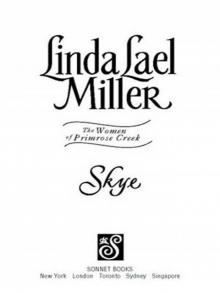 Skye
Skye McKettricks of Texas: Tate
McKettricks of Texas: Tate Springwater Seasons
Springwater Seasons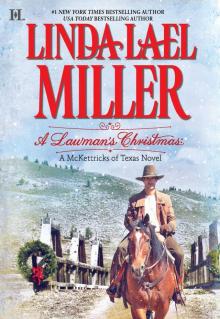 A Lawman's Christmas
A Lawman's Christmas Sierra's Homecoming
Sierra's Homecoming![Parable, Montana [4] Big Sky Summer Read online](http://i1.bookreadfree.com/i/03/22/parable_montana_4_big_sky_summer_preview.jpg) Parable, Montana [4] Big Sky Summer
Parable, Montana [4] Big Sky Summer One Last Weekend
One Last Weekend A Stone Creek Collection, Volume 2
A Stone Creek Collection, Volume 2 Tonight and Always
Tonight and Always Fletcher's Woman
Fletcher's Woman A Snow Country Christmas
A Snow Country Christmas The Last Chance Cafe
The Last Chance Cafe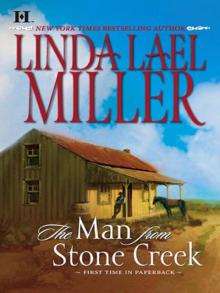 The Man from Stone Creek
The Man from Stone Creek Wanton Angel
Wanton Angel McKettricks of Texas: Garrett
McKettricks of Texas: Garrett Memory's Embrace
Memory's Embrace McKettrick's Luck
McKettrick's Luck Pirates
Pirates Big Sky River
Big Sky River Willow: A Novel (No Series)
Willow: A Novel (No Series) The McKettrick Legend: Sierra's HomecomingThe McKettrick Way (Hqn)
The McKettrick Legend: Sierra's HomecomingThe McKettrick Way (Hqn) Glory, Glory: Snowbound with the Bodyguard
Glory, Glory: Snowbound with the Bodyguard Two Brothers
Two Brothers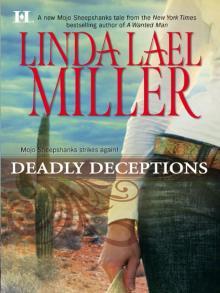 Deadly Deceptions
Deadly Deceptions Big Sky Secrets
Big Sky Secrets Garrett
Garrett A Creed in Stone Creek
A Creed in Stone Creek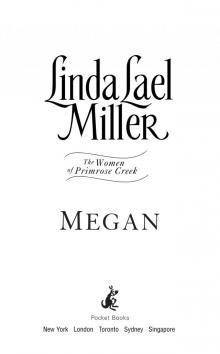 Megan
Megan McKettricks of Texas: Austin
McKettricks of Texas: Austin Knights
Knights High Country Bride
High Country Bride More Than Words Volume 4
More Than Words Volume 4 Glory, Glory
Glory, Glory Daring Moves
Daring Moves Lily and the Major
Lily and the Major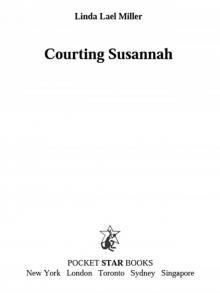 Courting Susannah
Courting Susannah Banner O'Brien
Banner O'Brien Big Sky Mountain
Big Sky Mountain Linda Lael Miller Bundle
Linda Lael Miller Bundle McKettrick's Pride
McKettrick's Pride A Stone Creek Collection Volume 1
A Stone Creek Collection Volume 1 A Wanted Man
A Wanted Man Big Sky Country
Big Sky Country The McKettrick Legend
The McKettrick Legend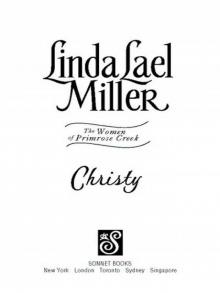 Christy
Christy McKettrick's Heart
McKettrick's Heart Resurrection
Resurrection Arizona Heat
Arizona Heat Secondhand Bride
Secondhand Bride Snowflakes on the Sea
Snowflakes on the Sea Montana Creeds: Tyler
Montana Creeds: Tyler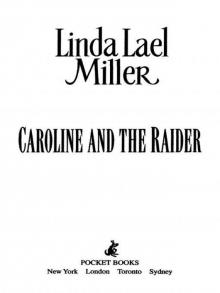 CAROLINE AND THE RAIDER
CAROLINE AND THE RAIDER A Proposal for Christmas: State SecretsThe Five Days of Christmas
A Proposal for Christmas: State SecretsThe Five Days of Christmas Yankee Wife
Yankee Wife Linda Lael Miller Montana Creeds Series Volume 1: Montana Creeds: LoganMontana Creeds: DylanMontana Creeds: Tyler
Linda Lael Miller Montana Creeds Series Volume 1: Montana Creeds: LoganMontana Creeds: DylanMontana Creeds: Tyler The Christmas Brides
The Christmas Brides McKettricks Bundle
McKettricks Bundle The Rustler
The Rustler Here and Then
Here and Then Only Forever
Only Forever Once a Rancher
Once a Rancher The 24 Days of Christmas
The 24 Days of Christmas Big Sky Wedding
Big Sky Wedding Emma and the Outlaw
Emma and the Outlaw Princess Annie
Princess Annie Wild About Harry
Wild About Harry That Other Katherine
That Other Katherine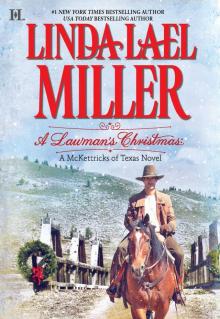 A Lawman's Christmas: A McKettricks of Texas Novel
A Lawman's Christmas: A McKettricks of Texas Novel Just Kate: His Only Wife (Bestselling Author Collection)
Just Kate: His Only Wife (Bestselling Author Collection)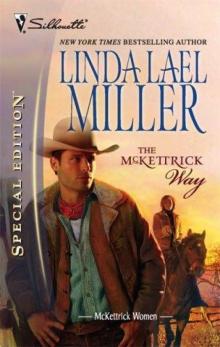 The McKettrick Way
The McKettrick Way Part of the Bargain
Part of the Bargain Taming Charlotte
Taming Charlotte Holiday in Stone Creek
Holiday in Stone Creek One Last Look
One Last Look Always a Cowboy
Always a Cowboy Batteries Not Required
Batteries Not Required A McKettrick Christmas
A McKettrick Christmas For All Eternity
For All Eternity The Marriage Season
The Marriage Season Corbin's Fancy
Corbin's Fancy The Creed Legacy
The Creed Legacy Springwater Wedding
Springwater Wedding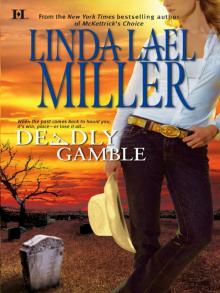 Deadly Gamble
Deadly Gamble Austin
Austin Creed's Honor
Creed's Honor A Creed Country Christmas
A Creed Country Christmas Escape from Cabriz
Escape from Cabriz There and Now
There and Now The Bridegroom
The Bridegroom State Secrets
State Secrets Bridget
Bridget